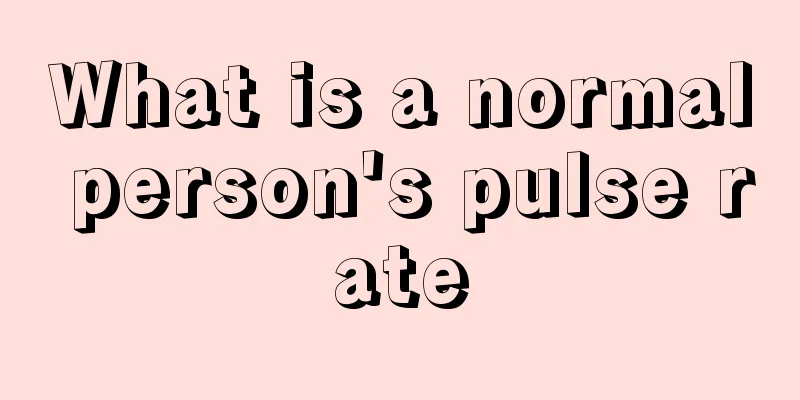What is a normal person's pulse rate

|
Pulse rate refers to the normal heart rate of our human body, and the normal human pulse rate is about 60-100 beats per minute. If it beats more than 100 times per minute, it may be a sign of too fast a heart rate. When the human body is in a quiet state, the heart rate will slowly calm down with the body, and will be around 60 beats per minute. Heart disease can easily lead to abnormal pulse rate. What is the normal pulse rate? Under normal circumstances, the pulse rate is equal to the heart rate, and the normal range is 60-100 beats per minute. If it is greater than 100 beats per minute, it is called tachycardia. If it is less than 60 beats per minute, it is called bradycardia. There are also some cases where the pulse rate is not equal to the heart rate. For example, in case of atrial fibrillation, the pulse rate will be significantly lower than the heart rate. If the heart rate is 100 beats, the pulse rate may be 80 beats. It is wrong to use pulse rate to calculate heart rate at this time. Therefore, it is usually better to count the heart rate directly rather than calculate it indirectly through the pulse method. You can do an electrocardiogram, which is more accurate. Heart rate refers to the number of heartbeats per minute in a normal person's quiet state, also called resting heart rate. It is generally 60 to 100 beats per minute, and may vary from person to person due to age, gender or other physiological factors. Generally speaking, the younger the age, the faster the heart rate. The elderly have a slower heart rate than the young, and women have a faster heart rate than men of the same age. These are all normal physiological phenomena. In a resting state, the normal heart rate for adults is 60 to 100 beats per minute, and the ideal heart rate should be 55 to 70 beats per minute (the heart rate of athletes is slower than that of ordinary adults, generally around 50 beats per minute). Factors associated with abnormal changes Heart rate changes are closely related to heart disease. If the heart rate exceeds 160 beats/minute, or is lower than 40 beats/minute, it is mostly seen in patients with heart disease. If it is often accompanied by palpitations, chest tightness and other discomforts, a detailed examination should be carried out as soon as possible so that treatment can be targeted at the cause. 1. Tachycardia When an adult's heart rate exceeds 100 beats/minute (generally not more than 160 beats/minute) at rest, it is called sinus tachycardia, which is common in people who are excited, agitated, smoke, drink alcohol, drink strong tea or coffee, or in pathological conditions such as infection, fever, shock, anemia, hypoxia, hyperthyroidism, heart failure, or after the use of drugs such as atropine, epinephrine, ephedrine, etc. 2. Bradycardia When an adult's heart rate is lower than 60 beats/minute (generally above 45 beats/minute) at rest, it is called sinus bradycardia, which can be seen in healthy people and athletes who engage in heavy physical labor for a long time; or in hypothyroidism, increased intracranial pressure, obstructive jaundice, and overdose of digitalis, quinidine or propranolol. If the heart rate is lower than 40 beats/minute, sick sinus syndrome, atrioventricular block, etc. should be considered. If the pulse is unequal and irregular and the pulse rate is less than the heart rate, atrial fibrillation should be considered. 3. Correctly view sinus bradycardia Many people experience sinus bradycardia with irregular heartbeats, which is normal for most people and there is no need to worry too much. Sinus bradycardia refers to a person with a heart rate of less than 60 beats per minute. Whether this symptom will occur depends on the frequency of the bradycardia and the cause of the bradycardia. When in a resting state, an adult's heart rate will generally not show obvious symptoms if it is between 50 and 60 beats per minute. Especially some well-trained athletes and people who engage in physical labor for a long time will not show obvious symptoms even if their heart rate is around 40 beats/minute in a quiet state. However, if the average person's heart rate is between 40 and 50 beats per minute, they will experience symptoms such as chest tightness, fatigue, and dizziness. If the heart rate drops to 35 to 40 beats per minute, hemodynamic changes will occur, affecting the blood supply to the heart and brain, resulting in chest tightness, dizziness, syncope, and even sudden death. If you do not feel any discomfort, you do not need to pay attention to the "sinus bradycardia with irregularity" mentioned in the electrocardiogram. However, if you experience symptoms such as chest tightness, fatigue, dizziness, etc., you should go to the hospital immediately for further examination, such as dynamic electrocardiogram, cardiac color ultrasound, etc., to understand the cause of bradycardia. If the heartbeat is too slow, a pacemaker can be installed to relieve the symptoms and improve the prognosis. |
<<: Is zinc oxide harmful to the skin?
>>: How often does a normal person defecate
Recommend
What causes lymphoma symptoms
When it comes to cancer, everyone knows that it i...
Imaging manifestations of pulmonary tuberculosis
The imaging manifestations of pulmonary tuberculo...
What is the reason for chest tightness and excessive phlegm
Modern people are under great pressure from work,...
Shelf life of milk powder after opening
Although everyone knows that breastfed babies are...
X-ray manifestations of pulmonary tuberculosis
Many people are infected with tuberculosis becaus...
Whey protein allergy symptoms
Many fitness enthusiasts take supplements, and wh...
Why do I have diarrhea immediately after eating something greasy?
Some people will encounter this situation, that i...
What to do if you get pregnant during chemotherapy for breast cancer
Many people may think that if breast cancer is fo...
What causes swollen lips? Five common factors that cause this phenomenon
Allergic reactions, keratoacanthoma, recurrent li...
How to kill cockroaches
There are cockroaches in many homes. Cockroaches ...
What are the typical symptoms of early lung cancer? Three common typical symptoms of early lung cancer
You may not know much about the symptoms of lung ...
Things to note when drawing blood for culture
Many people don't know much about blood cultu...
Can a person live without a stomach?
We will find that many people need to have their ...
What should I do if the soup pot is burnt?
It is common to see soup pots getting burnt, whic...
What are the symptoms of early gastric tumors?
Gastric tumor is a relatively serious malignant t...









